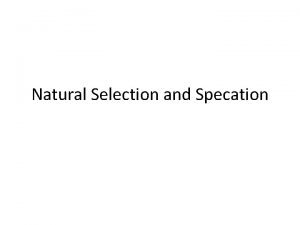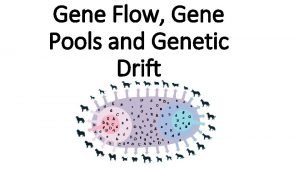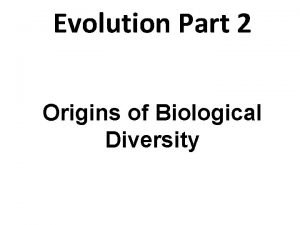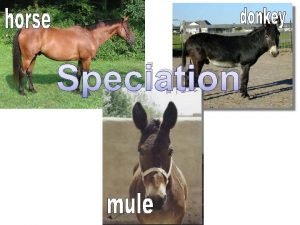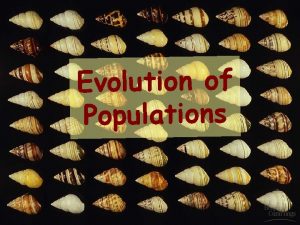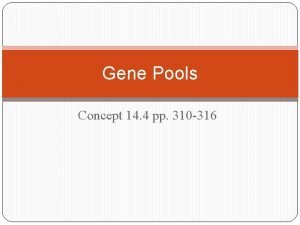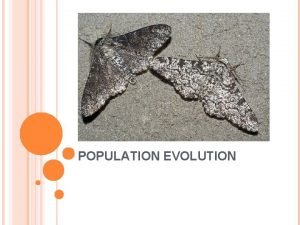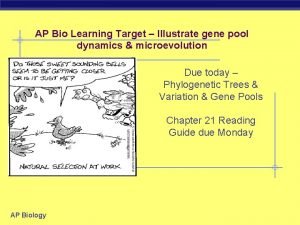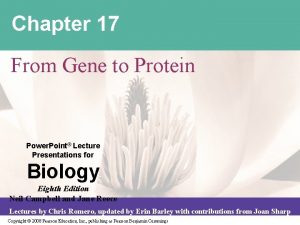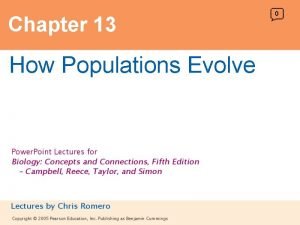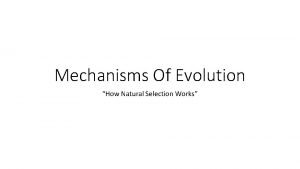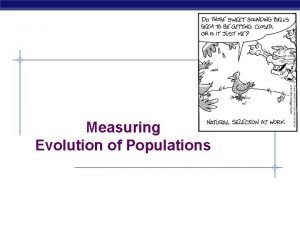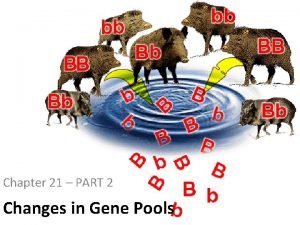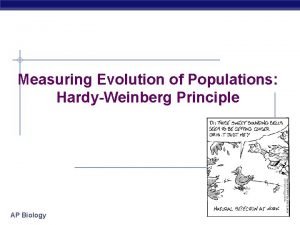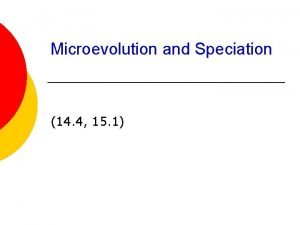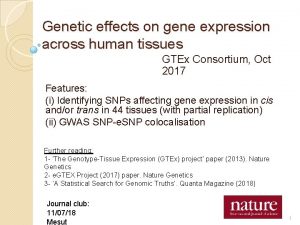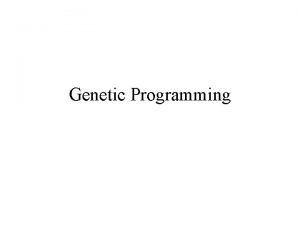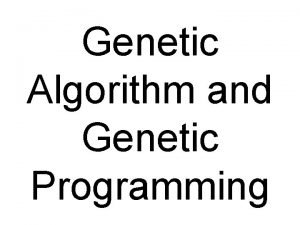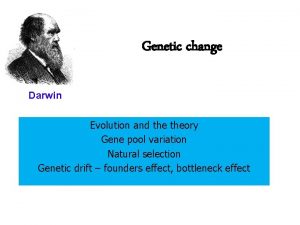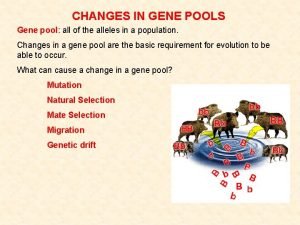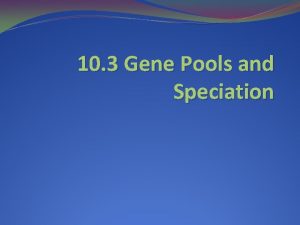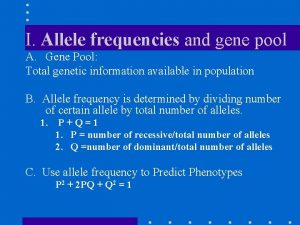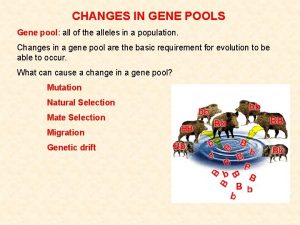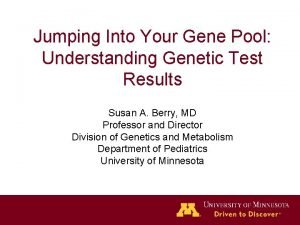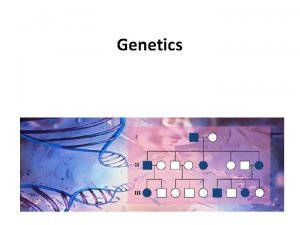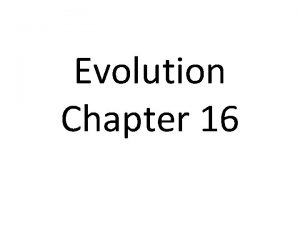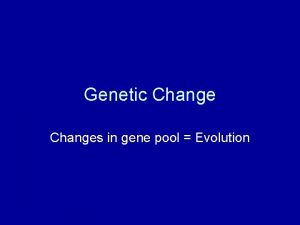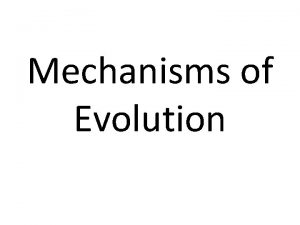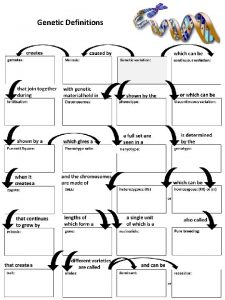Genetic Change Genetic Change The gene pool is


















- Slides: 18

Genetic Change

Genetic Change • The gene pool is the total number of different alleles that exist for a population.

Genetic Change • The gene pool is the total number of different alleles that exist for a population. • The processes of mutations, natural selection, migration, and genetic drift all affect the gene pool and change the frequency of the alleles in that gene pool.

Genetic Change • The gene pool is the total number of different alleles that exist for a population. • The processes of mutations, natural selection, migration, and genetic drift all affect the gene pool and change the frequency of the alleles in that gene pool. • Genetic Change therefore refers to the change in frequency of alleles in the gene pool of a population.

Genetic Change • The gene pool is the total number of different alleles that exist for a population. • The processes of mutations, natural selection, migration, and genetic drift all affect the gene pool and change the frequency of the alleles in that gene pool. • Genetic Change therefore refers to the change in frequency of alleles in the gene pool of a population. • Frequency of an allele in a population is given by the formula Frequency of an allele = occurrence of that allele total number of alleles

Genetic Change • The gene pool is the total number of different alleles that exist for a population. • The processes of mutations, natural selection, migration, and genetic drift all affect the gene pool and change the frequency of the alleles in that gene pool. • Genetic Change therefore refers to the change in frequency of alleles in the gene pool of a population. • Frequency of an allele in a population is given by the formula Frequency of an allele = occurrence of that allele total number of alleles

Evolution • The process in which new species develop from earlier forms.

Evolution • The process in which new species develop from earlier forms. • Normally occurs slowly, most often in response to a change in a species’ environment.

Evolution • The process in which new species develop from earlier forms. • Normally occurs slowly, most often in response to a change in a species’ environment. • Life is thought to have evolved from just a few unicellular organisms three billion years ago.

Evolution • The process in which new species develop from earlier forms. • Normally occurs slowly, most often in response to a change in a species’ environment. • Life is thought to have evolved from just a few unicellular organisms three billion years ago. • Evolution happens through ‘changes in the frequency of alleles in a population’ – some alleles do better than others.

Natural Selection • Darwin proposed theory of Natural Selection more than 150 years ago. It remains the best explanation of adaptive evolution.

Natural Selection • Darwin proposed theory of Natural Selection more than 150 years ago. It remains the best explanation of adaptive evolution. • Populations typically produce more offspring than the environment resources can maintain; therefore there is competition for survival.

Natural Selection • Darwin proposed theory of Natural Selection more than 150 years ago. It remains the best explanation of adaptive evolution. • Populations typically produce more offspring than the environment resources can maintain; therefore there is competition for survival. • Individuals with the best adaptations will survive and reproduce (fitness) and pass on to their offspring their successful alleles.

Natural Selection • Darwin proposed theory of Natural Selection more than 150 years ago. It remains the best explanation of adaptive evolution. • Populations typically produce more offspring than the environment resources can maintain; therefore there is competition for survival. • Individuals with the best adaptations will survive and reproduce (fitness) and pass on to their offspring their successful alleles. • The frequency of these alleles will then increase in the gene pool.

Natural Selection • Darwin proposed theory of Natural Selection more than 150 years ago. It remains the best explanation of adaptive evolution. • Populations typically produce more offspring than the environment resources can maintain; therefore there is competition for survival. • Individuals with the best adaptations will survive and reproduce (fitness) and pass on to their offspring their successful alleles. • The frequency of these alleles will then increase in the gene pool. • Environmental factors act as selecting agents of successful phenotypes.

Natural Selection • Darwin proposed theory of Natural Selection more than 150 years ago. It remains the best explanation of adaptive evolution. • Populations typically produce more offspring than the environment resources can maintain; therefore there is competition for survival. • Individuals with the best adaptations will survive and reproduce (fitness) and pass on to their offspring their successful alleles. • The frequency of these alleles will then increase in the gene pool. • Environmental factors act as selecting agents of successful phenotypes. • When environmental factors change, different phenotypes

Natural Selection • If the frequency of alleles changes, evolution is occurring.

Natural Selection • If the frequency of alleles changes, evolution is occurring. • After a certain number of generations, the frequency of the alleles and phenotypes might change so markedly that the population becomes reproductively isolated from other populations of that species – that is the new species.
 Founder population
Founder population Genetic drift
Genetic drift Gene pool
Gene pool Genetic drift definition biology
Genetic drift definition biology Genetic diversity
Genetic diversity Gene pool definition biology
Gene pool definition biology Individuals don't evolve populations do
Individuals don't evolve populations do Gene pool ap bio
Gene pool ap bio Chapter 17 from gene to protein
Chapter 17 from gene to protein Gene by gene test results
Gene by gene test results Genetic pool
Genetic pool Genetic drift v gene flow
Genetic drift v gene flow What is gene flow and genetic drift
What is gene flow and genetic drift Genetic drift vs genetic flow
Genetic drift vs genetic flow Genetic drift vs gene flow
Genetic drift vs gene flow Macroevolution vs microevolution
Macroevolution vs microevolution Genetic effects on gene expression across human tissues
Genetic effects on gene expression across human tissues Genetic programming vs genetic algorithm
Genetic programming vs genetic algorithm Genetic programming vs genetic algorithm
Genetic programming vs genetic algorithm
